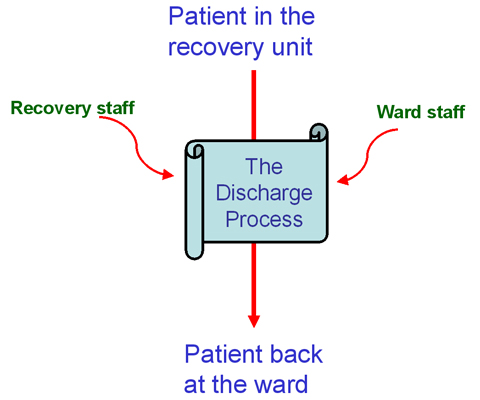It is likely that there will be local unit policies on discharging patients from recovery. Make sure you are familiar with these policies.
Question: What should the criteria for discharge from the recovery unit to the ward include?
Click here for the answer.

It is likely that there will be local unit policies on discharging patients from recovery. Make sure you are familiar with these policies.
Question: What should the criteria for discharge from the recovery unit to the ward include?
Answer: In principle, the following should be fulfilled:
- The patient should be fully conscious with a clear airway and intact airway reflexes
- Breathing with satisfactory breathing and oxygenation
- Stable and adequate circulation, with no persistent bleeding or unexplained cardiac irregularity. The patient’s blood pressure and pulse should have returned to near their normal pre-operative values
- Analgesia and antiemesis should be adequate and plans for post-operative ward analgesia and antiemesis appropriate for the operation should be documented
- Temperature should be normal
- Oxygen and intravenous therapy should be prescribed as appropriate
Question: Whose responsibility is it to discharge patients from the recovery unit?
Click here for the answer.

It is likely that there will be local unit policies on discharging patients from recovery. Make sure you are familiar with these policies.
Question: What should the criteria for discharge from the recovery unit to the ward include?
Answer: In principle, the following should be fulfilled:
- The patient should be fully conscious with a clear airway and intact airway reflexes
- Breathing with satisfactory breathing and oxygenation
- Stable and adequate circulation, with no persistent bleeding or unexplained cardiac irregularity. The patient’s blood pressure and pulse should have returned to near their normal pre-operative values
- Analgesia and antiemesis should be adequate and plans for post-operative ward analgesia and antiemesis appropriate for the operation should be documented
- Temperature should be normal
- Oxygen and intravenous therapy should be prescribed as appropriate
Question: Whose responsibility is it to discharge patients from the recovery unit?
Answer: It is the responsibility of the anaesthetist. However, if strict discharge criteria are followed, the task may be delegated to the recovery room staff.
Question: What happens if the patient cannot be discharged as one or more of the criteria are not met?
Click here for the answer.
It is likely that there will be local unit policies on discharging patients from recovery. Make sure you are familiar with these policies.
Question: What should the criteria for discharge from the recovery unit to the ward include?
Answer: In principle, the following should be fulfilled:
- The patient should be fully conscious with a clear airway and intact airway reflexes
- Breathing with satisfactory breathing and oxygenation
- Stable and adequate circulation, with no persistent bleeding or unexplained cardiac irregularity. The patient’s blood pressure and pulse should have returned to near their normal pre-operative values
- Analgesia and antiemesis should be adequate and plans for post-operative ward analgesia and antiemesis appropriate for the operation should be documented
- Temperature should be normal
- Oxygen and intravenous therapy should be prescribed as appropriate
Question: Whose responsibility is it to discharge patients from the recovery unit?
Answer: It is the responsibility of the anaesthetist. However, if strict discharge criteria are followed, the task may be delegated to the recovery room staff.
Question: What happens if the patient cannot be discharged as one or more of the criteria are not met?
Answer: There must be an anaesthetist available at all times if there is such a patient in recovery. The patient must be reviewed either by the anaesthetist who administered the anaesthetic, or the person who is responsible for the patient in recovery.